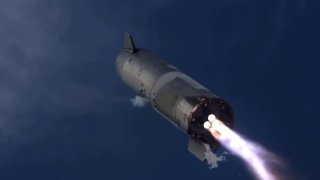
- The U.S. military is expanding a small development program that wants to leverage reusable rockets, like those SpaceX is building, to deliver cargo quickly to anywhere in the world.
- The experimental program, called Rocket Cargo, will be led by the U.S. Space Force.
- "We talked to a number of providers that we see potentially coming to the table to compete for these contracts," Dr. Greg Spanjers, the Air Force Research Laboratory's leader on the Rocket Cargo program, said at a news conference on Friday.
The U.S. Air Force said Friday is expanding a small development program that wants to leverage reusable rockets, like those SpaceX is building, to deliver cargo quickly to anywhere in the world.
Called Rocket Cargo, the experimental military program will be led by the U.S. Space Force, the Pentagon said. The program will research and help develop capabilities such as landing "a rocket on a wide range of non-traditional materials and surfaces," engineering "a rocket cargo bay and logistics for rapid loading and unloading" and air-dropping "cargo from the rocket after re-entry in order to service locations where a rocket or aircraft cannot possibly land."
The Air Force's 2022 budget proposal requested almost $50 million for Rocket Cargo to continue the study concept work it began last year with small contracts to SpaceX and Exploration Architecture Corporation (XArc).
Get top local stories in Southern California delivered to you every morning. >Sign up for NBC LA's News Headlines newsletter.
Rocket Cargo effectively describes the Starship rockets that SpaceX is developing, as the military program will look at fully reusable private rockets that can launch between 30 and 100 tons. Currently, Starship is the only rocket in development that plans to both be reused and can both launch that much mass.
Point-to-point space travel is a form of transportation, in which a rocket would launch into space and then return at another location, making it hypothetically capable of bringing supplies or possibly people from one side of the Earth to the other in under an hour.
SpaceX has been testing prototypes of Starship at its facility in Texas, most recently landing and recovering prototype SN15 after a high-altitude flight test. While SpaceX is aiming to accomplish a feat no previous rocket has achieved — reusing rockets quickly to make spaceflight more akin to air travel, instead of the traditional approach of discarding the rocket after launch — the last high-altitude flight test was the first that ended without the prototype exploding. The company has yet to reach orbit with the rocket.
Money Report
Dr. Greg Spanjers, the Air Force Research Laboratory's leader on the Rocket Cargo program, gave NASA's Human Landing Systems program competition as an example of companies working on "viable" options of the Rocket Cargo capability. That NASA program, which is focused on building lunar landers that carry crew to the moon's surface, featured three teams led by Elon Musk's SpaceX, Jeff Bezos' Blue Origin and Leidos' subsidiary Dynetics. But Spanjers said the Air Force has "talked to many more companies than that" about the Rocket Cargo program.
"We talked to a number of providers that we see potentially coming to the table to compete for these contracts," Spanjers said Friday. "SpaceX is certainly the most visible, no question about it … [but] what you're trying to do is go into an orbital or a suborbital trajectory, bring the payload back down, and land it on the planet Earth. There are multiple companies that have that technological capability today, not just SpaceX."
The Air Force declined to specify which companies it has talked to about the Rocket Cargo program, with Spanjers saying it is not "appropriate" before the Pentagon begins the contracting process. The contract solicitation is planned to begin very soon, although the Air Force declined to provide a date.
Additionally, the Air Force is willing to consider companies for Rocket Cargo which are not yet developing a point-to-point fully reusable capability.
"Today we are going to build the interfaces and the inroads to encourage more and more companies to enter into that realm. Hopefully they perceive a return on investment, in a business case that's approved by the [Department of Defense] expressing interest in buying the service down the road," Spanjers said.
Become a smarter investor with CNBC Pro.
Get stock picks, analyst calls, exclusive interviews and access to CNBC TV.
Sign up to start a free trial today.






